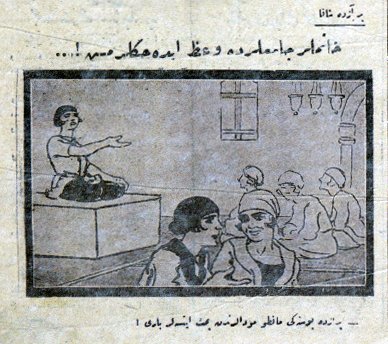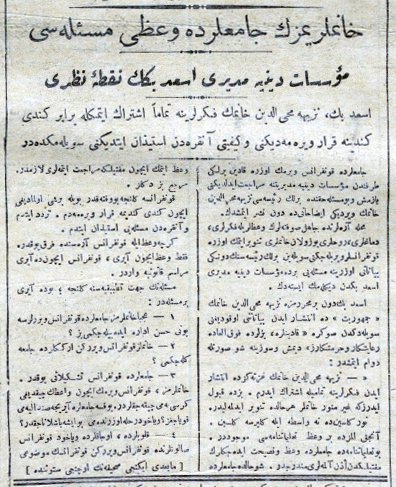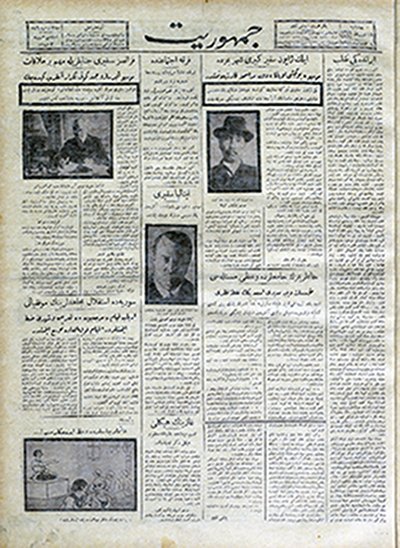33. Today in 1920s Turkey: 18 November 1925 (Breaking the Domed Ceiling One Fashion Choice at a Time)

(Cartoon, Cumhuriyet or “Republic,” 18 November 1925, no. 549, page 1.)
Comments:
The daily newspaper, Cumhuriyet often features a small cartoon in the lower left corner of its front page under the title “A Little Joking Around” (Biraz da Şaka). Today’s cartoon pokes fun at a recently proposed plan for a women’s association to use mosques for meetings. The cartoonist depicts the interior of an unnamed mosque’s prayer hall as it may appear with the onset of feminine bodies hitherto excluded from this sacred space. At the front of the room is a woman seated on an elevated podium gesturing while she speaks. Only half of the flock of women gathered before the “preacher” listen to her sermon as others chit chat among themselves. Presumably the words below the cartoon represent those of the two women in the foreground. Unimpressed with their she-preacher’s topic of choice, they suggest she talk about something more interesting to her audience of womenfolk, like fashion. Here are the translations/transcriptions of the cartoon’s text.
English:
Above: Women are going to preach in mosques [apparently]!
Below: — They should at least mention this year’s trends in winter coats!
Türkçe:
Üstte: Hanımlar camiilerde vaaz edeceklermiş!..
Altta: — Biraz da bu seneki manto modalarından bahs etseler bari!
These kinds of sexist jokes were not uncommon in Turkey and around the world in the 1920s. This was an especially cruel “joke” given the fact that the cartoon provides commentary on a real story concerning the disenfranchisement of women. An article on the same page of the cartoon entitled “The Issue of Our Women Sermonizing in Mosques,” reveals that Cumhuriyet ran an article on the same subject yesterday. Yesterday’s article was about the president of the Turkish Woman’s Union, Nezihe Muhiddin proposing that the association provide lectures at mosques aimed at educating women who have been under the influence of corrupt religious figures, superstitions, and other harmful beliefs. Today’s article is partially comprised of an interview with director of religious institutions, Mr. Asad who, while voicing “exceptional” support for the matter, divulges that this is not a matter that he has any control over. He goes on to enumerate the various logistical difficulties (e.g. will we need to put chairs in the mosque?) that would have to be sorted out before such a proposal could come to fruition. Basically, he gives the Woman’s Union the runaround. It is hard to reconcile the “do or die” mentality that drove the epic War of Independence just a few years ago with this list of lame excuses. I guess some things are worth fighting for, and others are just a little too much trouble.

(Article, Cumhuriyet or “Republic,” 18 November 1925, no. 549, page 1.)
For more on how governing bodies avoid taking action by purposefully giving their constituents the proverbial runaround see:
Arendt, Hannah. “Civil Disobedience.” In: Crises of the Republic, 49-102. New York: Harcourt Brace, 1972. (See especially pp. 72-73)
For more on the tyranny of bureaucracy (i.e. the rule of Nobody) and how it purposefully diffuses responsibility and conveniently (through inconvenience) refuses action see:
Arendt, Hannah. “On Violence.” In: Crises of the Republic, 105-198. New York: Harcourt Brace, 1972. (See especially pp. 137-141)
But enough about institutions that cannot make things happen; let’s talk about people who are movers and shakers. Let’s talk about women’s rights activist Nezihe Muhiddin (1889-1958), the president of the Turkish Woman’s Union who proposed using mosques as educational venues for women. She was the founder of the first political party, the Women’s People Party (Kadınlar Halk Fırkası), established under the new Turkish state in 1923. Not recognized by the new government, the party was dismantled and Nezihe Muhiddin continued her activities as the president of the Turkish Woman’s Union. She ran for office (as a representative in parliament) in 1925 despite the fact that it was not legal for women to hold office or vote. Even though her candidacy was rejected not all was lost as her act of civil disobedience brought the issue of women’s suffrage to public light. It is possible that the activist's request to provide lectures in mosques for women was motivated by a similar objective. Nezihe Muhiddin no doubt knew what a problematic proposal that was. In the end, however, it at least forced a discussion about the lack of educational opportunities available to women in the 1920s.
Muhiddin was also an accomplished teacher and prolific writer. Later, in 1935 (right after women gained the right to vote and run for office in 1934) she ran for parliament as an independent candidate to represent Istanbul.
See also: https://tr.wikipedia.org/wiki/Nezihe_Muhiddin

(Entire page, Cumhuriyet or “Republic,” 18 November 1925, no. 549, page 1.)